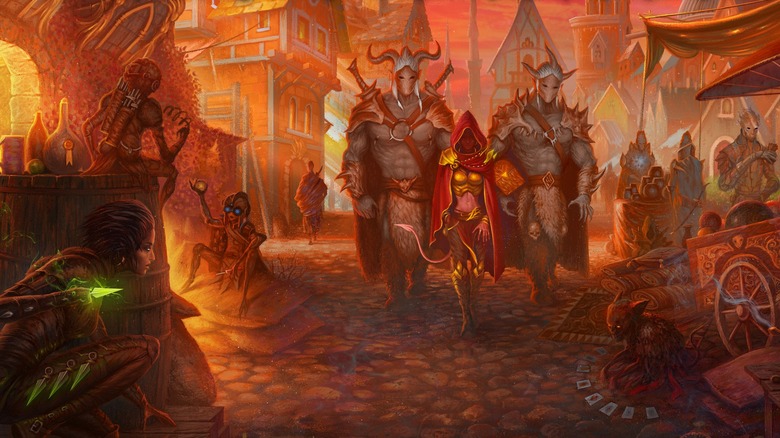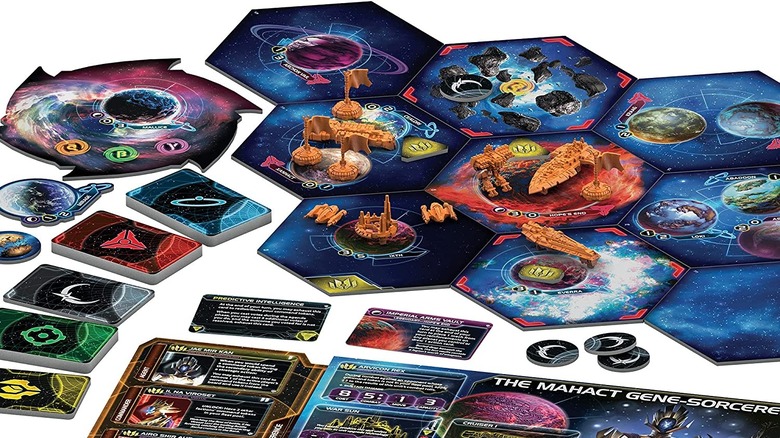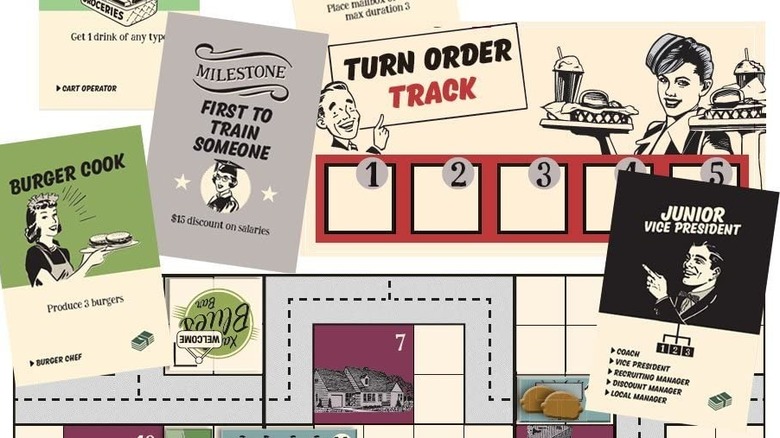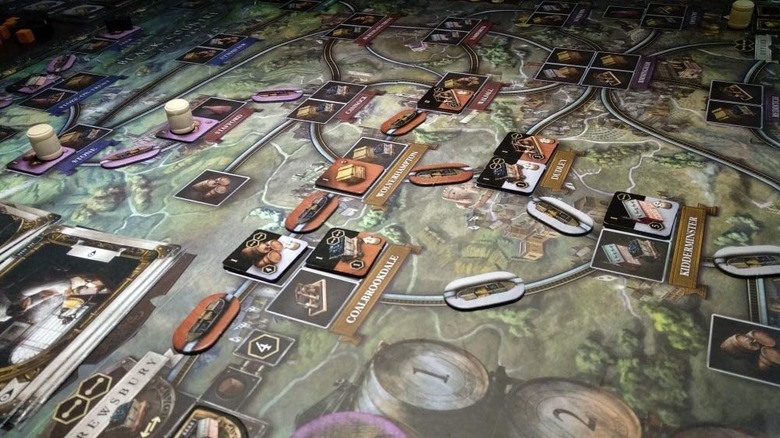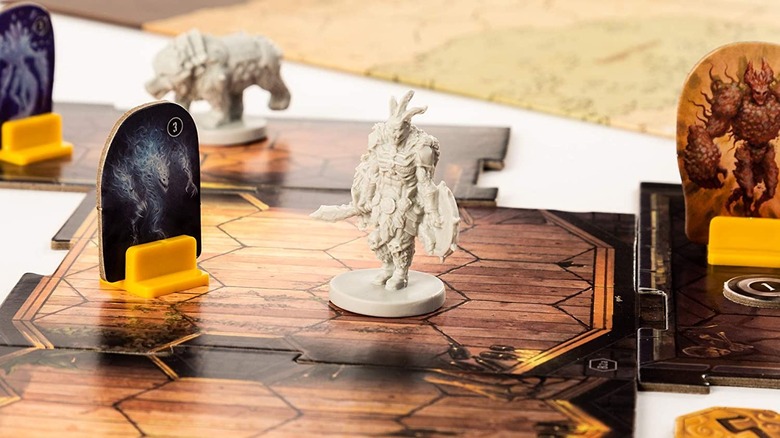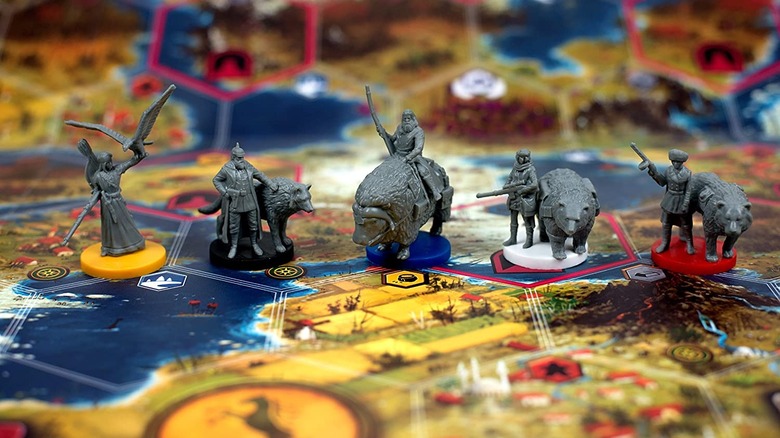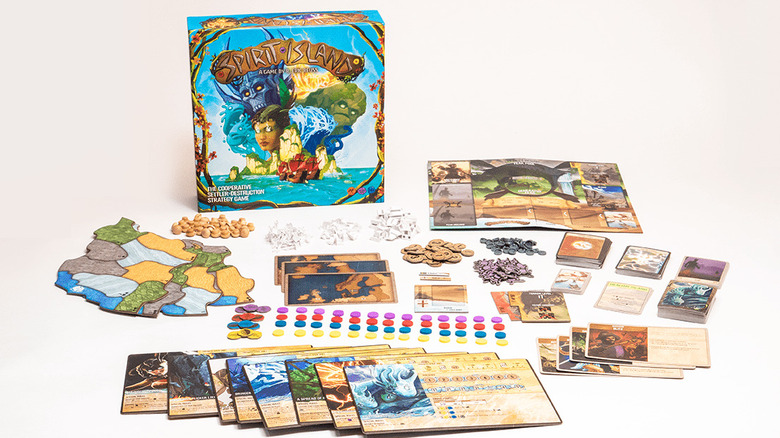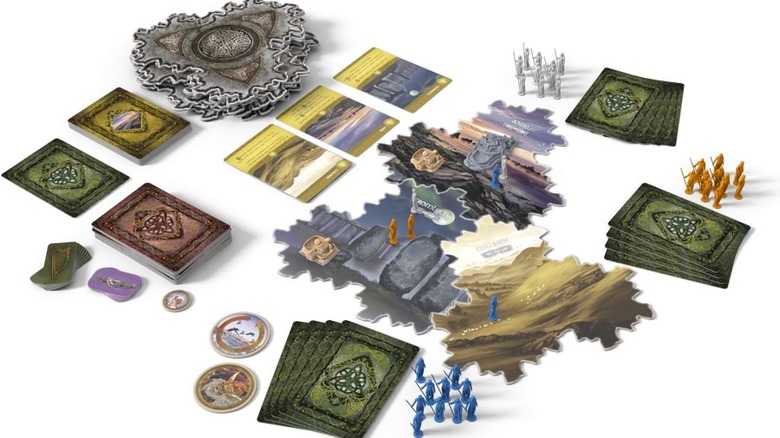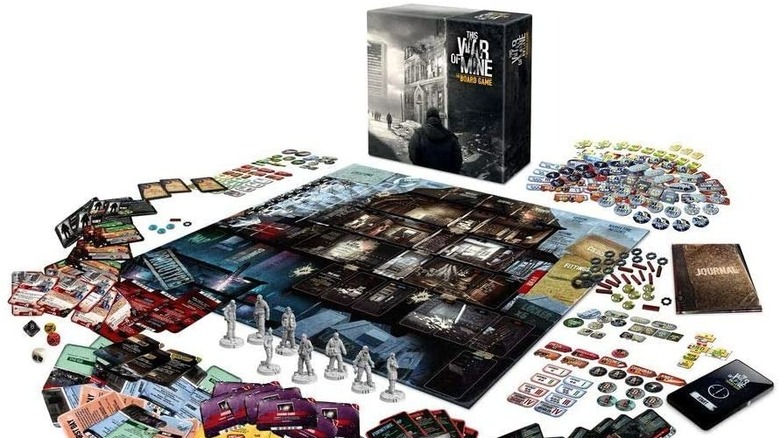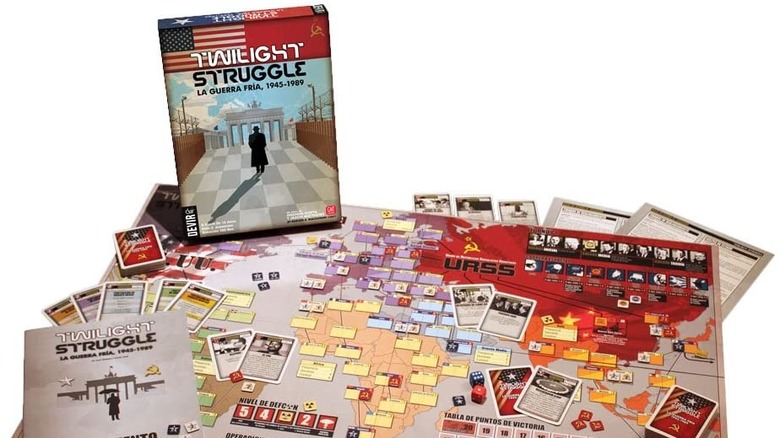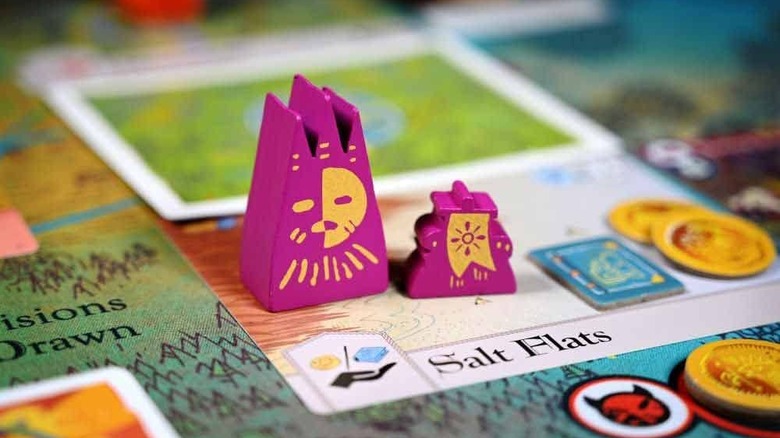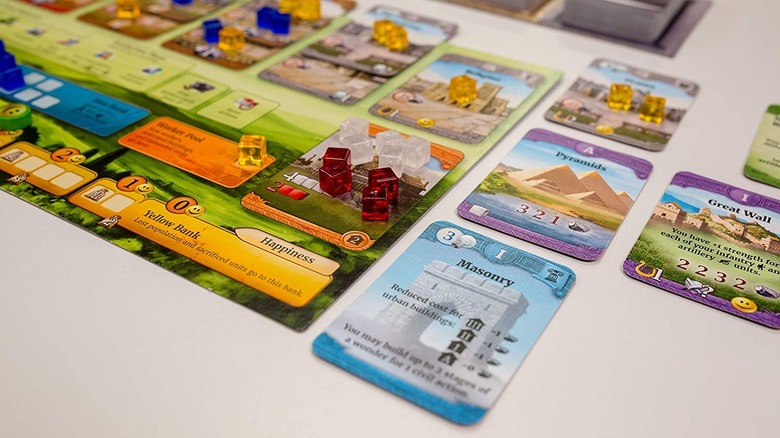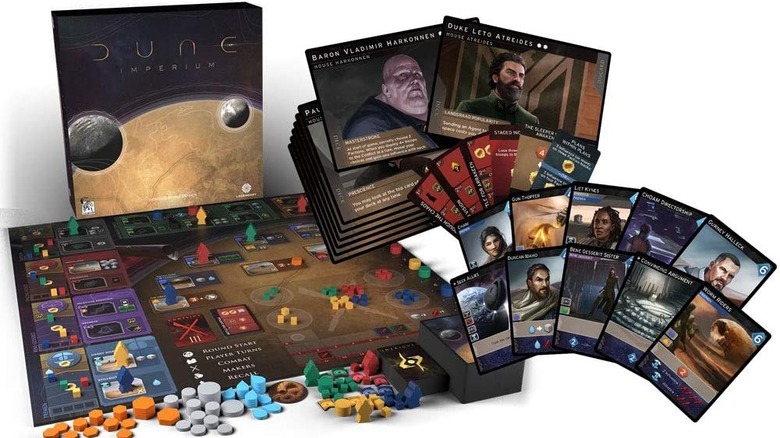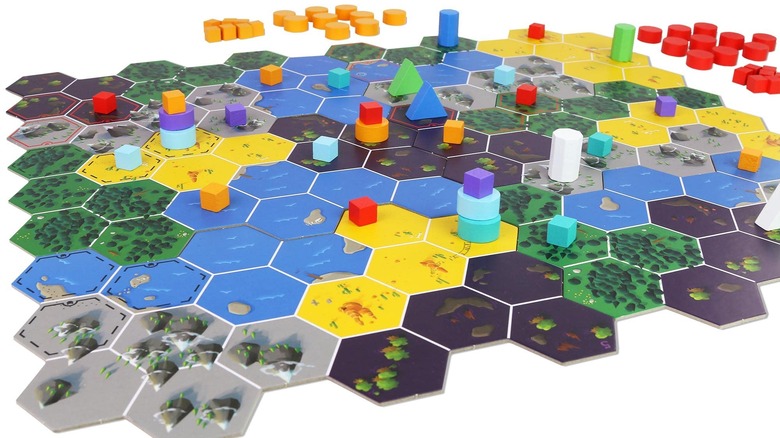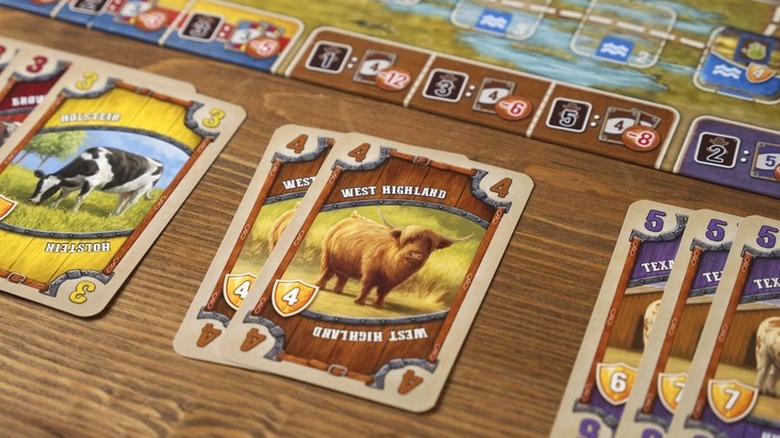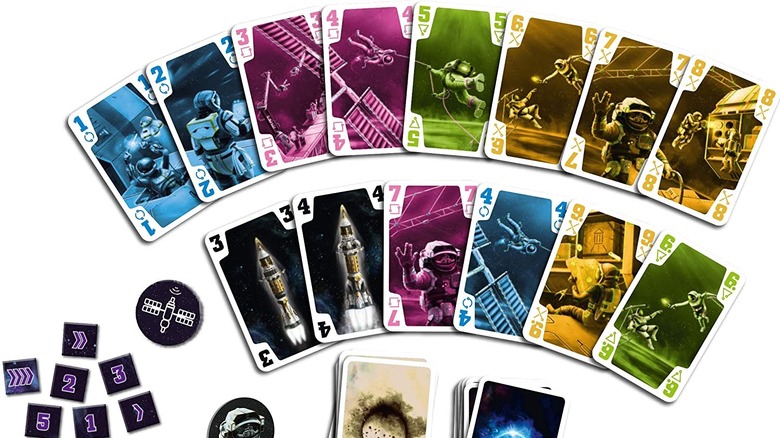The 15 Best Strategy Board Games Ranked
There is an element of strategy to every board game, but some embrace the notion of planning and preparation more than others. In my book, the best board games provide a mountain of information and ask you to filter through it. That can mean complex combinations of cards and mechanics or just nonverbal cues from your partner. How you use that information determines whether or not you will emerge victorious. Over the past few years, the board game industry has produced a lot of high-strategy games. Many of these titles are expensive mountains of cardboard that take hours to set up and learn, but some of them are still simple enough to be taught in a single setting. Some encourage eight players — here's looking at you, "Twilight Imperium" — and some are a pure solitary experience.
This list attempts to thread the needle, picking from among the modern classics of strategy games to provide a ranked experience I can stand behind that also highlights games that stand out from the crowd. There may be more strategically satisfying games, but these 15 titles stand out among strategy-first games. If you've read some of our other lists, you might see a few repeat titles, but it's like I always say: board game recognizes board game. What was I supposed to do, leave "Spirit Island" off this list? I don't think so.
1. Twilight Imperium Fourth Edition + Prophecy of Kings Expansion
As the designated rules explainer for most of my board game groups — even those I do not organize — I always like to be prepared. That's why I have a binder with the "Twilight Imperium: Fourth Edition" rules, even though I do not own a copy of the game. In any group, your host is only your friend for so long into the evening. Forewarned is indeed forearmed. "Twilight Imperium" is a classic example of the 4X genre of board games, which invites players to explore, expand, exploit, and exterminate the map and their opponents. In "Twilight Imperium," you and up to five of your friends compete for control over the galaxy, managing your resources to explore and conquer your neighboring star systems. With a modular boasting turn-based tile placement, each "Twilight Imperium" game is unique, allowing for endless variety in gameplay and strategy.
For as much fun as "Twilight Imperium" can be (I'm gonna figure out the Nekro Virus one of these days, I swear) there is also an endurance element that makes it a must-try for any board game group. "Twilight Imperium" is to friends what Ikea is to relationships; if you think you are close to someone, pressure test that friendship with an eight-hour session of this game. The animosities and frustrations will become part of the lore of your relationships, giving you a metagame that is just as enjoyable as the tabletop experience itself.
2. Food Chain Magnate
When a board game proudly shouts its lack of dice from its box cover, you know that you're in for something fun. "Food Chain Magnate" is a gorgeous throwback to 1950s America, complete with the pop art and utopian suburbs synonymous with that period in history, but — like the 1950s — underneath that upbeat veneer is a cruel, unyielding economic engine that wants to grind you into dust. Capitalism is a cruel god in all its many forms.
In "Food Chain Magnate," you play the CEO of a fledgling fast-food chain. Each turn, you will hire and train workers, invest in marketing, and supply delicious burgers to the residents of your neighborhood. As the game advances, players must manage their workforce (hiring and firing to remain under budget) and expand their footprint to reach more houses on the map. Once the bank runs out of money twice, the wealthiest player wins ... it's as simple as that. Spending time away from work intentionally roleplaying capitalism might seem like a special layer of hell for some. To its credit, "Food Chain Magnate" fully embraces its difficulty level and offers players both an introductory game mode and a strategy guide with tips for new and experienced players. "If you make a mistake," the rules read, "it can be very hard or even impossible to get back on track." In the fast-food business, as in life, there are very few opportunities for second chances.
3. Brass: Birmingham
Listen, I'm not going to lie: I will probably never play "Brass: Birmingham." The praise for this one is endless, and I appreciate that many consider it a stone-cold classic, but one of the things I've reluctantly come to realize about myself is that I'm not a high-minded board gamer. I need my games to be a little spectacle-driven, and "Brass: Birmingham" is the kind of cold, calculated strategy that would absolutely chew me up and spit me out. "Brass: Birmingham" is set during England's Industrial Revolution, with you and your opponents playing as captains of industry between the 1700s and 1800s. Players discard cards from their hands to take action, allowing them to build out their commercial networks, develop and play new industries, and put themselves in debt with the bank. As the rulebook notes, because drinking water was in high demand during this period, players will even battle over beer to lubricate the gears of successful commerce.
Part of what makes "Brass: Birmingham" so tricky is its two-era approach. Dominating the first Canal Era can give you an early advantage, but players remove all first-level industry tiles from the board between eras. This requires you to be strategic about your involvement. As the civilization around you advances, your bread-and-butter industries may become obsolete, requiring you to play ahead (at least a little) or dig yourself into a terrible hole. If you like juggling economies and capitalizing on scarcity, then "Brass: Birmingham" is the game for you.
4. Gloomhaven
A small part of me wants to avoid putting "Gloomhaven" on almost every one of my /Film lists, but the truth is this game is the foundation of several of my friendships. At this point, I'm in year two of my campaign, which means that our current playthrough of "Gloomhaven" has had a more significant part in my life than several previous jobs and more than one ex-girlfriend. If those are not words of encouragement for a board game, then I don't know what is. In "Gloomhaven," you and up to three friends take on the role of wandering adventurers based in the township of Gloomhaven. As you venture forward and complete missions, your party will add equipment, manage your skills, and build out a deck of abilities specific to your class. Using the game's unique card-based action system, each dungeon you enter will become a careful balance of health points and ability cards. Go too big, and exhaustion might sideline you before any monster gets the chance.
Depending on your party's size and commitment level, "Gloomhaven" can easily take between 100-200 hours to finish. As the game progresses, your party will change and evolve, with new classes getting unlocked and current characters hitting their victory conditions and retiring. With "Frosthaven" — the even-bigger sequel to "Gloomhaven" — set to release later this year, you and your friends will have even more cardboard to conquer. Just take a page from my book and make sure one friend has a 3D printer.
5. Scythe
Given that I write a regular series about movie-adjacent board games for /Film, it should be no surprise that the theme of a game is essential to me. In fact, give me a choice between a great theme or good mechanics and I will almost always take the latter. So it pains me deeply that I have yet to play a session of "Scythe," one of the most unique and compelling themes to ever be committed to cardboard. It is the 1920s, but not the 1920s we know. In "Scythe," the Great War is the trigger for a steampunk revolution, and warring factions have only now brokered an uneasy peace. Scattered outside The Factory (the ominous city-state that brought mechs into the world) each faction will navigate the board, collect resources, and manage units to emerge victorious. Players compete to be the first to meet six special win conditions on the Triumph Track using a combination of individual and unique faction mats.
What makes "Scythe" great is the variety of gameplay options available to players. Yes, you can manage your resources to perfection — and there are plenty of options available — but you can also wage war against your opponent and generate encounters across the map. This makes it a game with appeal for any style of boardgamer. With a rich foundation and a depth of strategy, "Scythe" remains a gold standard of modern board games and is unlikely to be knocked off its perch anytime soon.
6. Spirit Island
Single-player modes are always a challenge for board game lovers. It's a balance that many games cannot get right, resulting in multiplayer games with a tacked-on single-player mode or solo games with extra player counts that nobody ever uses. Then there's "Spirit Island," the now-classic area control game that often shines in solo mode but remains a favorite of two-and three-player board game groups everywhere. It's a frequent title on /Film lists, but that's only because everyone should own a copy. In "Spirit Island," players take on the role of benevolent island deities who must awaken and fight an invading European force. By using and upgrading powers and managing the faithfulness of your believers, your deity can put the literal fear of god into its opponents, driving out enemies and causing wanton destruction that tilts the map to your favor.
Often described as an anti-colonialist board game, "Spirit Island" also backdoors a powerful lesson about imperialism into its complicated mechanics. Frequently named the best single-player game by the 1-Player Guild (their annual People's Choice awards highlight the best solo games in the industry), "Spirit Island" is something of a Goldilocks game. You can spin up a campaign on your own or connect with a friend, but both experiences will offer you tense gameplay and dynamic decision-making throughout. If you're tapped into conversations about representation in board games and want to step away from civilization games about white men, then "Spirit Island" is the perfect addition to your collection.
7. Inis
Board game developers will not rest until every civilization is represented by miniatures on a modular game board. Not like that's a bad thing, of course. "Inis," a 2016 game from developer Christian Martinez, immerses players in the folklore and legend of ancient Ireland. Players take on the role of warring Irish chieftains and use cards to control territories, expanding their presence through the Irish isles. Only one clan can emerge victorious. Each chieftain will participate in an action card draft at the beginning of a round. Players are dealt four cards and choose one to keep, then they circulate the remaining cards to the next player in turn order and choose two to keep. This process repeats three times, allowing players to tinker with their hands as new cards and new strategies become available ... and keep an eye on what their opponents might be thinking.
From there, players will use their action cards to spawn units, initiate battles in territories, and angle for both control and influence over the map. The basic mechanics of "Inis" will be familiar to anyone who has played games by Eric M. Lang ("Blood Rage," "Ankh: Gods of Egypt"), but the extra layer of transparency gives "Inis" a richness of depth that is uniquely it's own. For that extra little bit of flavor, cue the perfect traditional Irish music playlist in the background. I recommend the songs of Raelach Records, an artist-run label based in County Clare.
8. This War of Mine
When I start on any new list for /Film, the first question I ask is always the same: Can I work "This War of Mine" into the mix? Thankfully — or unfortunately, depending on your willingness to tackle complicated board games — the game slots right into this article. Based on the popular mobile game of the same name, "This War of Mine" is a layered and excruciating look at the experience of being a wartime refugee. Designed for many, but best with one, it invites players to take on the role of a community doing their best to survive a war. Each round is an excruciating exercise in scarcity, with players juggling the need for supplies against the dangers that gangs and declining health will have on their survivors. Each random encounter card brings a balance of risk and reward but surviving until a ceasefire will take everything you've got as a community.
In my first playthrough of "This War of Mine," defeat came upon me suddenly when one character succumbed to their addictions, and their fellow survivors gave up after their death. For all the board games I've played since this one, those cascading moments of sadness stand out most vividly in my brain. This is not a game for everyone (please review the content warnings closely before deciding to add it to your collection) but it remains maybe the most immersive and emotional tabletop experience I've had to date.
9. Twilight Struggle
One of the funny things about games is the push-pull between strategy and luck. Strategy games — or games that require you to strategize against the board — are often considered the pinnacle of design. Meanwhile, luck-based games — usually games that need you to strategize against the player — are considered less tactical, even though understanding the rules comes far more naturally to many (myself included) than understanding your opponents. The marriage of these two methods makes "Twilight Struggle" the gold standard of two-player design. As the two sides replay the most cinematic moments of the Cold War (one side the US, the other side the USSR) a parallel history will unfold, with the Iron Curtain shifting and evolving to match the machinations of each player. Using cards for both influence and events, players will jockey for control over the map by exerting force, inspiring local revolutions, or even spending aggressively on the space race.
And if you are new to "Twilight Struggle," my advice would be to find a single opponent and plan for multiple matchups. The most important part of each "Twilight Struggle" session is the 15 minutes after it ends, where you and your friend debrief your decision-making and lament every wrong decision that puts victory one stop further out of reach. I'm on my third or fourth session with one friend, and the woulda-shoulda conversations continue long after the game has been packed up. In our cold war, there will never be a winner.
10. Oath: Chronicles of Empire & Exile
Of all the games in my collection, I've gotten the most mileage out of "Oath: Chronicles of Empire and Exile." The joke is that I'm being literal: I purchased my copy of "Oath" in New York City and carried it with me for my 1,700-mile flight back to Texas. Sadly, "Oath" remains in its original plastic, waiting for its turn in my board game group rotation. Still, I continue to immerse myself in the rulebook and How To Play videos, just waiting for the right chance to launch a generations-long war against my friends. In "Oath," your group battles for rule over a declining empire. As the Chancellor works hard to retain control over the empire, the other players — exiles from the kingdom and pretenders to the throne — do their best to amass the power and influence needed to topple the ruling player. Like so many wonderful area control games, players will often have to form tenuous partnerships with their opponents to push their own agenda across the finish line.
The biggest hook for "Oath" is that it is a legacy-adjacent game. Each playthrough makes small-but-impactful changes to the board and cards, giving the game a progressive narrative without overtly relying on legacy mechanics to get there. This makes "Oath" a game with both replay and standalone value, something rare in the legacy market. You can quickly spin up a new group for "Oath" without having to buy components on the secondary market.
11. Through the Ages: A New Story of Civilization
Civilization games are an old standby in both the video game and tabletop industries. If you don't mind a little plastic (or hell, a whole bunch of plastic) then a game like "Through the Ages: A New Story of Civilization" can provide a shocking amount of depth. This is my civilization-builder of choice, one that gives you and your friends various play options and countless paths to victory. Players will use their actions each turn to acquire cards from the center row. Leaders, wonders, technologies, and action cards all provide a combination of one-time or ongoing benefits, but at the end of each round, civilization will progress, and some of these cards will be removed from play forever. Players then use these resources to amass workers and build military units while occasionally changing their government to match their current style of play.
Like several of the games on this list, there is also a digital version of "Through the Ages," though this version is optimized for mobile (and not just available through a tabletop emulator). If the game is too complicated to get onto the table regularly, you can always scrounge up a group of friends, learn the gameplay through the app, and bring those insights to the table a few times a year. Honestly, the "Through the Ages" app was the perfect COVID-buster in the early days of 2020, and it might be a good fit for your group, too.
12. Dune: Imperium
I have a real love-hate relationship with worker-placement games. On the one hand, I love the challenge of building out contingency plans for when your first and second options fall through. On the other hand, I am always so focused on my own little economic engine that I often forget to sabotage my opponents' plans. My favorite worker-placement games are the ones where I find more fun in the process than in the (loss) results. The breadth of options available to me in "Dune: Imperium" makes my inevitable runner-up placement very palatable.
In "Dune: Imperium," players battle for the planet Arrakis. Through deckbuilding and worker-placement strategies, players barter for influence with the critical on-world factions, fill their coffers with supplies, and engage in battles for resource bonuses. As a result, each turn affords your house with various options and complimentary mechanical paths — cards, placements, and more — to help you earn more victory points than your opponents. The unique combination of deckbuilding and work placement makes this one special. Purchasing and removing cards from your deck is deeply intertwined with your placement options. The wide range of mechanics gives you an important extra level of control over your fate. Even if players continue to purchase the spaces you need, the Imperium Row will always give you a compelling consolation prize. Since the game is based on the movie adaptation, you'll even get to enjoy the somber likenesses of Josh Brolin and Timothée Chalamet as you (lose) play.
13. Cryptid
One of my great regrets from my last trip to Maine was that I walked into but did not visit the International Cryptozoology Museum. Billed as the only museum of its kind in the world, this building promised a treasure trove of documents about creatures like Bigfoot, the Loch Ness Monster, and other half-known urban legends. So even if this does position this list towards a little bit of recency bias, when a game like "Cryptid" asks me if I want to be a cryptozoologist, the answer is yes. "Cryptid" is a game of hidden information and token placement. Players start with an enormous habitat for their maybe monster and a series of clues. As the game unfolds, players will ask questions of their opponents, using cubes and discs to exclude or highlight locations, respectively. With dozens of tiles, terrains, and places to use as reference points, finding the creature is far from easy. Eventually, the only possible spot on the board will reveal itself to a lucky winner.
Each round you will effectively exchange information with your opponents, getting closer to finding the cryptid's hiding place while also passing along valuable information to your peers. To find the creature, you must figure out your opponents' clues without giving up your own hidden criteria. The closer you get to understanding your opponent, the closer you get to giving up your own secrets. This push-pull of knowledge is what makes "Cryptid" easy to learn and hard to master.
14. Great Western Trail
They say not to judge a book by its cover, and I guess the same could be said for board games, too. Despite having box art that looks like it was ripped from the kind of game you would find in a late-90s middle school classroom, "Great Western Trail" is a universally beloved combination of worker placement, task management, and deckbuilding. To win the "Great Western Trail," players must travel along with the board from Texas to Kansas City to sell their cattle. Each turn includes three parts — movement, actions, and drawing cards — with the spaces on the board determining what players can do on their turn. Final scoring varies, with players earning victory points for everything from cattle cards to worker placement to train station locations. There's a lot to keep track of and many ways to win, meaning this isn't a job for the faint of heart. You could probably say that about cattle rustling, too.
Even among some of the complex titles on this list, "Great Western Trail" stands out. The rulebook is 16 pages long, and every square inch is crammed with text. The game's popularity has inspired a handful of high-quality explainer videos, and determined players should have no trouble finding a visual aid to complement their reading. If you like your complex economic engines to come with the gentle twang of a banjo, then "Great Western Trail" is the kind of board game you want to add to your collection.
15. The Crew: The Quest for Planet Nine
For many, trick-taking games was the original introduction to the tabletop hobby. I can remember playing games of rummy on middle school volleyball trips (I was terrible at both) and learning the habits of my friends so I could easily thwart their next play. That same blend of tricks and player EQ makes "The Crew: The Quest for Planet Nine" the perfect rules-light strategy game for the entire family.
In "The Crew," you and your friends play as astronauts looking to complete a series of extraplanetary missions. Like most trick-taking games, players use their cards to match, break, or trump the leading suit. This mechanism allows each player to complete the individual task assigned to them. The catch comes in the game's mandated silence. Each player knows which card their partner needs to collect, but without the ability to communicate, you never know if the card you play will doom your current mission to failure. Better learn how to emote with your eyes. While most games on this list are cardboard behemoths, "The Crew" is light in both complexity and price, with a hard sci-fi concept that gives the game just enough theme to hang together. That's excellent game design in my book.
